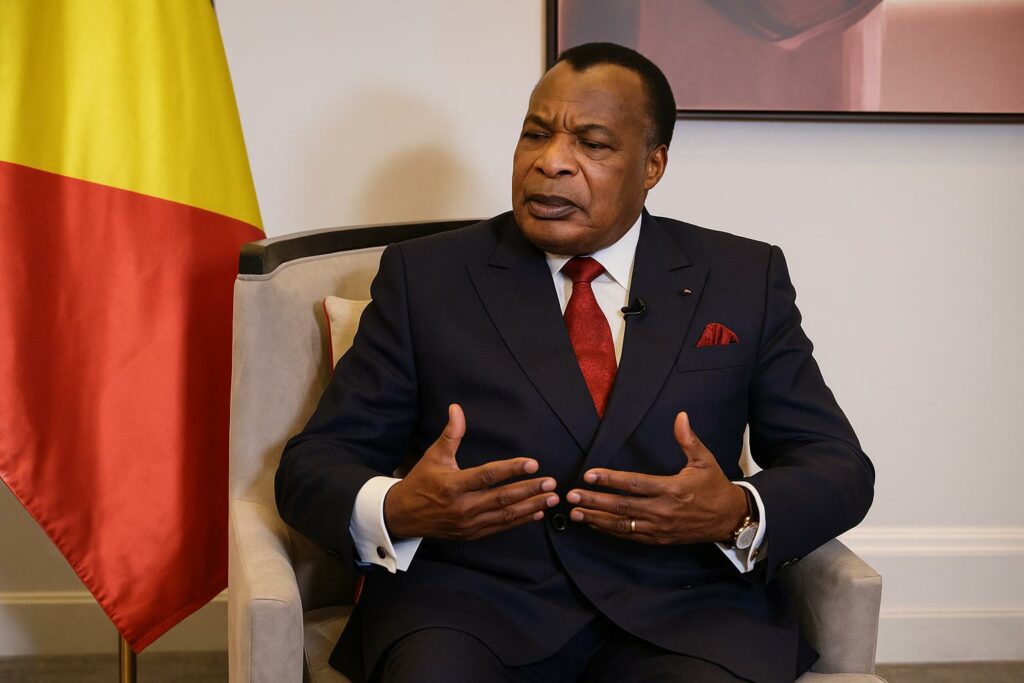Peace diplomacy meets economic calculus
Speaking on the margins of the United Nations General Assembly in New York, President Denis Sassou Nguesso expressed satisfaction that former US president Donald Trump continues to frame peace agreements as a gateway to shared prosperity. The veteran Congolese statesman, who has witnessed every White House occupant since Jimmy Carter, argued that “without peace there is no development”, a credo he says underpinned Brazzaville’s mediation in the late-1980s talks that hastened Namibian independence and Nelson Mandela’s release.
Trump’s claim of having worked to defuse seven conflicts in as many months struck a familiar chord in Brazzaville. From the Central African Republic to Libya, Nguesso chairs or has chaired African Union high-level panels and insists that restoring calm in hotspots is the surest path toward regional growth. By endorsing Washington’s diplomatic surge, the Congolese leader positions his country as an ally able to lend hard-won experience in shuttle negotiations across the continent.
Assessing the state of US–Congo relations
Congo-Brazzaville enjoys long-standing yet under-exploited ties with Washington. American oil major Chevron has operated offshore for decades, but broader US private-sector exposure remains modest compared with Asian or European competitors. According to UNCTAD data, the United States accounted for barely three per cent of inward foreign direct investment stock in 2022, well behind China and France (UNCTAD 2023).
Nguesso sees the shortfall as a knowledge gap. “Often we feel Americans do not know Africa well enough,” he told our reporter, urging deeper business literacy of Central Africa’s markets. The Africa-US leaders’ summits hosted by former presidents Barack Obama and Joe Biden created avenues that Brazzaville hopes to widen, notably in agriculture technology, power infrastructure and digital services.
Energy and critical minerals: a portfolio in search of partners
With a population of just 5.8 million and a gross domestic product of roughly USD 14 billion (World Bank 2022), Congo packs a resource punch that belies its size. Proven oil reserves are estimated at two billion barrels while untapped offshore gas and onshore iron-ore, potash and phosphate deposits position the country to ride the global demand for transition minerals.
Nguesso argues that US investors can complement existing Asian participation by bringing advanced environmental standards and corporate governance practices. He cites the Pointe-Indienne iron project and a liquefied natural gas scheme under way at the port of Pointe-Noire as ventures where American technology could accelerate timelines. The government’s 2023 Hydrocarbons Code, offering improved production-sharing terms and arbitration clauses anchored in OHADA business law, aims to reassure prospective partners.
Congo Basin stewardship: from rhetoric to financing
Covering two-thirds of national territory, Congo’s portion of the equatorial rainforest forms part of the so-called “Green Lung” that absorbs an estimated 1.2 gigatonnes of carbon annually—more than the Amazon on a per-hectare basis according to Nature (2021). Brazzaville therefore occupies a pivotal place in the UN-declared Decade of Ecosystem Restoration that began in 2021.
The president recalled having rallied 17 basin states behind a dedicated climate fund headquartered in the Congolese capital. Seeded by the World Bank, the vehicle seeks additional bilateral contributions. Although Washington pledged USD 100 million to the Central African Forest Initiative in 2022, none of those resources are earmarked for the Brazzaville-based fund, a gap Congolese negotiators are keen to bridge at COP28 in Dubai later this year. A forthcoming national inventory of carbon stocks—conducted with the French Development Agency—could strengthen Congo’s case for results-based payments under Article 6 of the Paris Agreement.
Security flashpoints and the migration nexus
Asked about conflict in neighbouring Democratic Republic of Congo, Nguesso voiced support for US-brokered talks involving Kigali and Kinshasa over the M23 insurgency. Although Brazzaville is not a direct party, calm on its eastern frontier would enhance the entire sub-region’s investment climate. The president further argued that a stable Libya is pivotal to stemming jihadist incursions into the Sahel and halting dangerous migration routes across the Mediterranean.
He welcomed Italian Prime Minister Giorgia Meloni’s Mattei Plan, which channels infrastructure finance into African countries to tackle root causes of displacement. In his view, expanding industrial and agribusiness opportunities in Congo would dissuade young Central Africans from risking their lives at sea.
À retenir
Nguesso’s strategic message is consistent: peace is the prerequisite for growth, and growth is unattainable without diversified partnerships. By courting US attention while maintaining cordial ties with Russia and China, Brazzaville seeks to maximise optionality in an increasingly multipolar order.
Le point juridique/éco
Recent fiscal reforms aim to cap public-debt-to-GDP at 70 per cent in line with CEMAC convergence criteria, while the 2024 Finance Bill consolidates a move from ad-hoc tax exemptions to a transparent incentives code vetted by parliament. Legal experts in Brazzaville note that the arbitration clause referring disputes to the Common Court of Justice and Arbitration in Abidjan reinforces investor confidence without compromising national sovereignty.

